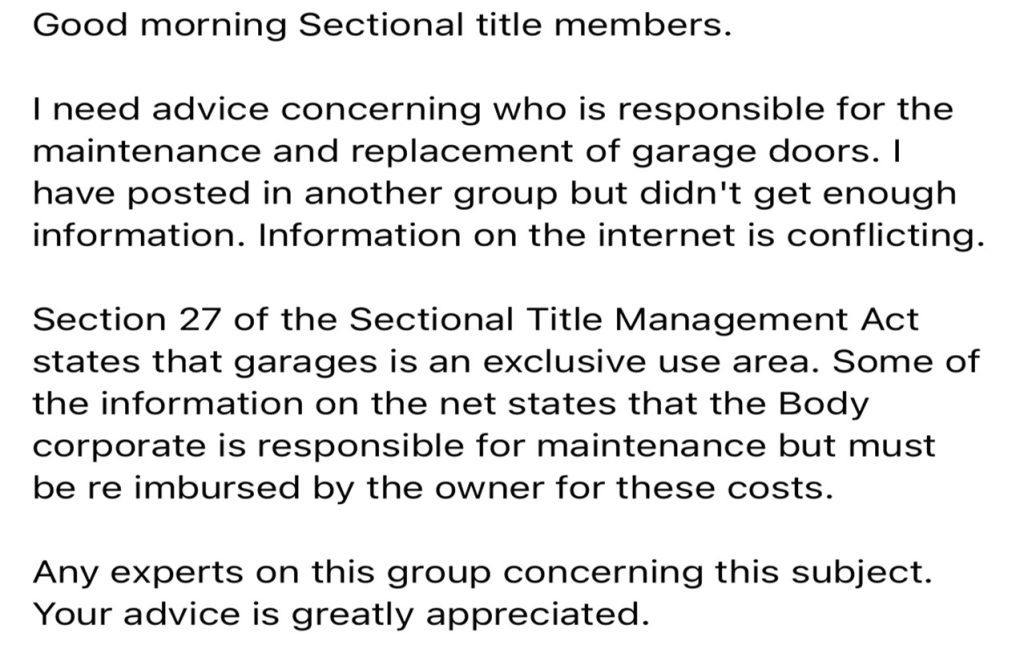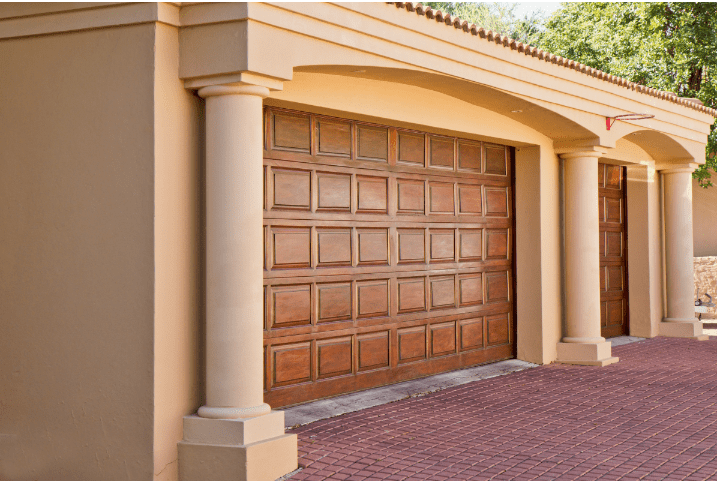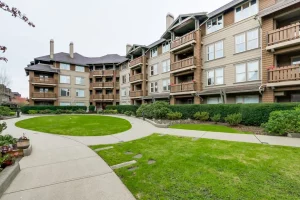Recently a question was asked on the Sectional Title Living in SA Facebook Group about who is responsible to maintain a garage door in a sectional title scheme. The question read as follows:
Introduction
Recently a question was asked on the Sectional Title Living in SA Facebook Group about who is responsible to maintain a garage door in a sectional title scheme. The question read as follows:

What is the legal nature of a garage door?
Garage doors located in the exterior walls of sections will be partially part of the section (the inner 50%) and partially part of the common property (the outer 50%). It could be that a garage has been made subject to exclusive use either on the sectional plan or in the scheme’s rules. Therefore, either the sectional plan will define the boundaries of each section in the building (and note whether the garage is subject to exclusive use), or the scale-layout diagram attached to the rule creating the exclusive use garage will show the boundaries and extent of the exclusive use area.
Who is financially responsible to maintain garage doors?
In terms of section 3(1)(l) of the Sectional Titles Schemes Management Act (“the STSM Act”), the body corporate must maintain all the common property, which includes the exterior part of any wall, door or window that forms a boundary between a section and common property.
In terms of section 13(1)(c) of the STSM Act, the owner must repair and maintain the interior part of any wall, door or window that forms a boundary between a section and common property. Therefore, the expenses (which could include maintenance, repair and replacement costs) in regard to garage doors in an exterior section wall should be split equally between the owner and body corporate.
Where the garage is an exclusive use area
An exclusive use right gives the owner or occupier of the unit the right to use and enjoy a specific part of the common property to the exclusion of all other owners and occupiers. The body corporate retains the primary responsibility to organise the maintenance of common property that is subject to exclusive use areas. The responsibility to pay for the maintenance for the part of the common property that is subject to exclusive use is transferred to the owner who has the benefit of the exclusive use area. This is the position unless the rules specifically state otherwise.
Replacement of garage door
If the garage door is beyond effective repair, and the only permanent solution will be its replacement, then the replacement could either fall within maintenance or be an improvement depending on the circumstances. Maintenance and improvements are authorised differently, and it is for this reason that it important to understand what the distinction between maintenance of common property and improvements to the common property is. Maintenance strives to keep the common property in its original state of appearance and functionality. The trustees have the discretion to authorise maintenance of common property subject to the approved budget and any directions or restrictions imposed.
Improvements add to, alter or upgrade the common property. If the garage door is replaced with more expensive materials in circumstances where the existing materials are available, then the replacement would be an improvement. The process set out prescribed management rule (“PMR”) 29(2) must be followed to authorise the replacement in circumstances where it is an improvement.
The body corporate can fund the improvement by either using reserve funds; or by raising a special levy if it is necessary that this is done before the next annual general meeting (“the AGM”); or the body corporate can include the expense in the next budget presented for approval at the AGM. The cost of the replacement of the garage door that forms a boundary between the sections and common property should then be split equally between the owner and body corporate.
Written by Dr Carryn Melissa Durham













